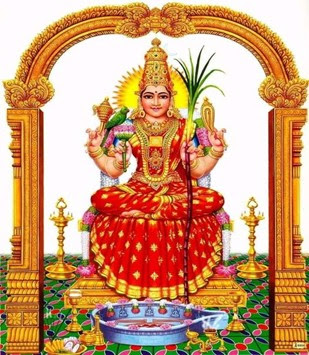The Divine Mother knows all the rasas.
Rasa is sentiment or emotional expression in poetry.
The Divine Mother enjoys nine types of emotions expressed in poetry and six types of tastes.
The Divine Mother knows all types of rasas expressed in poetry. The nine types of rasas are:
1.
Romanitic
(srngara, called the King of rasas)
2.
Compasanate
(karuna)
3.
Heroic
(virya)
4.
Comic
(hasya)
5.
Furious
(raudra)
6.
Terrible/fearsome
(bhayanaka)
7.
Odious
or disagreeable (bibhatsa)
8.
Marvelous
(adbhuata) and
9.
Quiescent/peaceful
(shanta)
The
ability to express any of the nine rasas at appropriate times is innate in the
Divine Mother.
The Divine Mother knows how to enjoy six types of tastes, namely, Sweet (Madhura), Sour (Amla), Salty (Lavana), Pungent (Katu), Bitter (Tikta), and Astringent (Kashaya). They are believed to balance the human body's doshas (energies) and are categorized based on the elements they are composed of, as explained in Ayurveda. The Divine Mother is a Knower of all tastes.
“He is rasa itself,” says the Sruthi. Brahman is rasa, the very source of bliss. The Divine Mother who is same as the Brahman, is then the knower of that bliss in Brahman.
Rasa is the sense of the taste or desire for something. Every living being has the greatest taste in its life itself, and the Divine Mother is truly the basis for those tastes.
Raasa also means the essence of anything. For example, the Brahman is the rasa of the entire universe. When the amount of knowledge to be acquired is infinite, and our capacity to learn is very limited, it is essential for us to focus on the essence of everything. There is a sloga which say the essence of all the very huge eighteen puranas – Parograpuniya, papaiya prarabeenam. That means helping others will earn us punya and harming others will result in papa(sin).
C N Nachiappan
Singapore,
02 April 2022; updated 21 June 2025
References:
1.
The
Thousand Names of the Divine Mother published in English by Mata Amritanandamis
AparnaSan Ramon, California, USA, with Commentary by T. V Narayana Menon
2.
Shri
Lalitha Sahasranama Stostram published in Tamil by N. Ramaswami Iyer charities’
societies, Trichirapalli, India, with Commentary by C. V. Radhakrishna Sastry.
3.
The
Lalitha Sahasranamam published in Tamil by Shri Ramakrishna Thapovanam,
Thiruipparaithurai, Trichy District, Tamilnadu, India with commentary by
Shrimath Swami Sithbavandar


No comments:
Post a Comment